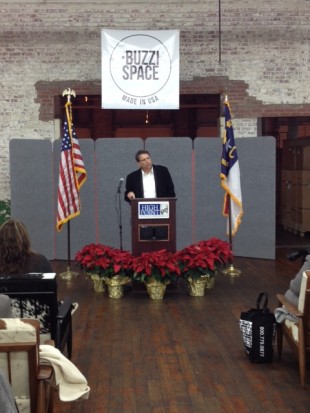Press Release:

High Point, N.C. - Governor Pat McCrory was in High Point today for the grand opening of the North American Headquarters of BuzziSpace, a manufacturer of high-end office furniture. The move, and the 113 jobs and nearly $2 million investment, was announced just 10 months ago. The headquarters will be located and operate out of the old Pickett Cotton Mill in downtown High Point. Governor McCrory used the grand opening to highlight the importance of the Historic Tax Credit, which will sunset at the end of the month.
"This was my third time at the historic old Pickett Cotton Mill and each time I visit, I see the mill and surrounding areas starting to rebound because of the impressive investment from BuzziSpace," said Governor McCrory.
"This area was once booming with a flurry of activity but has sat idle for decades until now, thanks to BuzziSpace. Secretary Susan Kluttz and I want to mimic what we see here today across the state, and that's exactly why the historic tax credit is so important to North Carolina."
Since 1998, federal and state historic rehabilitation tax credit projects have brought nearly $1.5 billion of private investment into North Carolina through an impressive 2,483 projects. Historic rehabilitation projects have taken place in 90 of our 100 counties, from rural to suburban communities.
"Historic preservation incentives are critical to the rebirth of rural and urban downtowns," said Susan Kluttz, secretary of the N.C. Department of Cultural Resources.
"Jobs are created and economic development occurs when abandoned buildings are reborn into apartments, shops and business spaces. We've seen this happen across North Carolina, in both small towns and large cities. These incentives also preserve our unique history and community fabric."
The Fayetteville Observer and Winston-Salem Journal recently highlighted the importance of the historic tax credit. Below are highlights from editorials.
Fayetteville Observer: McCrory right to seek restored tax credits
"Cities like Fayetteville saw the historic character of their older districts preserved at the same time that residential and commercial redevelopment was taking place. The credits helped revitalize areas that otherwise faced a continuing spiral into decay and blight.
"Gov. Pat McCrory said last week that he was displeased. McCrory would like to see a modified version of the credit approved early next year.
...
"As the Fayetteville experience shows, the credits are valuable to large urban communities with aging downtowns and historic residential districts. But McCrory also correctly notes their potential for bolstering the economies and boosting the civic pride of smaller communities.
"In small-town North Carolina, the appearance of the strength of ... the centers of town, shows the strength of the region," the governor said. "And you've got old historic buildings that are empty and blighted, and yet we've got potential investors who want to revitalize that, and we've had that... (The historic tax credit) was eliminated in this legislative session and we've got to bring it back."
"Lawmakers need to see that these credits aren't just for cities like Fayetteville and Wilmington, but can also offer new life to towns like Red Springs, Maxton, Elizabethtown or Lilington.
"Either way, they bring construction work and new businesses, both of which mean jobs. And creating jobs is worth forgoing a few tax dollars."
Winston-Salem Journal: Preservation tax credits: McCrory right on retaining them
"We're with Gov. Pat McCrory on retaining historic preservation tax credits for North Carolina.
"McCrory recently traveled to the historic Pickett Cotton Mill in High Point to announce his support for salvaging the historic preservation tax credit programs that are set to expire at the end of this year, Greensboro's News & Record reported. He's included the credits in his proposed budget.
"These tax credits have been used to develop several properties in our own downtown, including Wake Forest BioTech Place and the old Forsyth County Courthouse, which developers have just begun to convert to apartments. Developers can apply for them to offset the cost of renovating historic properties if they agree to retain significant architectural features that keep the spirit of the structures alive. It's an important economic tool that encourages development and, for a city that honors its past even as it moves into the future, a way to preserve a bit of history.
...
"We'd like to see the full amount retained - we could use them to spur on some large projects downtown - but support the governor in his attempt to keep some form of the tax credits alive. He sees their importance; let's hope he can convince the legislature."
- Contact: Crystal Feldman
- govpress@nc.gov












 High Point, N.C. - Governor Pat McCrory was in High Point today for the grand opening of the North American Headquarters of BuzziSpace, a manufacturer of high-end office furniture. The move, and the 113 jobs and nearly $2 million investment, was announced just 10 months ago. The headquarters will be located and operate out of the old Pickett Cotton Mill in downtown High Point. Governor McCrory used the grand opening to highlight the importance of the Historic Tax Credit, which will sunset at the end of the month.
High Point, N.C. - Governor Pat McCrory was in High Point today for the grand opening of the North American Headquarters of BuzziSpace, a manufacturer of high-end office furniture. The move, and the 113 jobs and nearly $2 million investment, was announced just 10 months ago. The headquarters will be located and operate out of the old Pickett Cotton Mill in downtown High Point. Governor McCrory used the grand opening to highlight the importance of the Historic Tax Credit, which will sunset at the end of the month.










